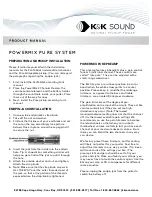
stewmac.com
14
Don’t oversand the veneer
The back and sides are laminted with mahogany veneer .
They’re quite smooth to begin with, and don’t require much
sanding . If you were to sand unnecessarily deep, you might
reach wood that’s near the glue under the veneer . This could
produce uneven results when staining . This doesn’t apply
to the top wood, which is solid mahogany .
Raise the grain by damp sanding
Sandpaper cuts away the fuzzy fibers of wood grain . Sanding
causes some of these fibers to lay down flat, even though
they haven’t been removed . When wet finish touches them,
the fibers lift up and make your finish feel rough .
Solve this problem by raising the grain with a damp rag .
When you’re done with the 180-grit sanding, wipe the wood
with a rag that’s been dipped in water and squeezed-out,
leaving it just damp . After the wood dries, you’ll feel the
roughness of the raised grain .
Sand with 220-grit
Now move on to sanding with 220-grit, which cuts away the
fibers raised by the damp rag . Completely sand the body and
neck . After sanding with 220, the wood is ready for finish .
Before finishing, you need to establish the bridge location in
order to tape off the area where it will be glued later .
Locate the bridge
A dowel makes good block for sanding the waist .
Sand to make sharp edges slightly rounded .
The bridge needs to be at the correct distance from the
string nut for your uke to play in tune . We’ve made locating
the bridge very simple: you just need one measurement .
Dry-fit the neck onto the body using one of the neck joint
dowels . With a straightedge down the middle of the fret-
board, find the center point on the tail of the uke . Mark this
on a piece of tape .
Measure carefully along this centerline to locate the bridge .
Start from the end of the fretboard where it will contact the
nut, and locate the distance indicated in the drawing below,
depending on the size of your uke .
This is the distance from the nut to the front edge of the
bridge, not the distance to the bridge saddle .
Use a piece of tape to mark this location on the uke . The tape
should be longer than the width of the bridge . With your
straightedge, mark the centerline on this tape .
Center the neck
Check to see if the neck is centered . Place the straightedge
along both sides of the fretboard and mark the tape at the
bridge location . These two marks should equally straddle the
centerline that you’ve already marked . If they’re off-center,
shift the neck until it’s centered .
Measure from the front of the nut to the
front of the bridge (not the saddle)
Nut
13
3
/
8
"
14
3
/
4
"
16
11
/
16
"
Soprano
Concert
Tenor
Tape
Bridge
Mark fretboard edge lines
See if the neck is centered
Watch the video:
PART 6
SANDING THE BODY+NECK
Содержание ukulele kit
Страница 1: ...Sheet i 5351 Updated 11 17 Assembly Instructions UKULELE KIT StewMac ...
Страница 21: ...stewmac com 21 ...
Страница 22: ...stewmac com 22 ...
Страница 23: ...stewmac com 23 ...










































